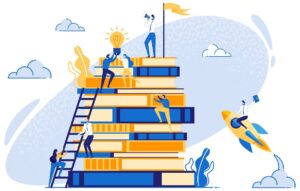Education has always held a sacred place in human development. Over the years, the realm of education has transformed, adapted, and redefined itself to meet the ever-changing needs of society. Each era has witnessed a new wave, a fresh approach, and an innovative method that captures the essence of knowledge sharing and growth. Today, we find ourselves standing at the crossroads of revolution, as education transcends the boundaries of traditional classrooms and embraces a future where learning knows no limits.

As we embark on this journey of exploration, one cannot overlook the recent shift in educational practices that has taken the world by storm. Remote learning, once seen as an alternative option, has now become a common practice in schools and universities worldwide. The challenges it presents are manifold – from maintaining student engagement to providing access to quality education for all. However, with the right blend of technology, innovation, and dedicated educators, remote learning has the potential to revolutionize the way we perceive education.
Within the realm of education, experiential learning has emerged as a standout teaching method. It capitalizes on the power of hands-on experience, encouraging students to actively engage with their learning environment. Whether it is through field trips, internships, or community projects, experiential education offers a unique opportunity for students to apply theoretical knowledge to real-life situations. It fosters critical thinking, problem-solving skills, and instills a sense of curiosity and creativity within individuals. By merging classroom learning with real-world experiences, experiential education prepares students for the challenges they will face in their future endeavors.
Tech-driven classrooms have become the new norm in education, and rightly so. The influence of technology has transformed the way knowledge is imparted and received. From interactive whiteboards to virtual reality, technology has opened up avenues for personalized and inclusive learning. It enables educators to tailor their teaching methods to suit the unique needs of each student. Technology also bridges the gap between traditional learning and the digital world, equipping students with the tools and skills necessary to thrive in an increasingly digitalized society.
Looking ahead, the future of education holds immense potential. Institutions play a pivotal role in shaping minds and nurturing young talents. They must embrace the changing landscape, instilling in their students not only knowledge but also adaptability, resilience, and a passion for lifelong learning. The traditional notion of education as a static, one-time endeavor is gradually giving way to an understanding that learning must be continuous—a lifelong journey that remains relevant in the face of a fast-paced world.
In this ever-evolving world, access to education should not be restricted to the confines of institutions alone. The advancement of technology allows for learning to be accessible to all, transcending geographical boundaries and socioeconomic barriers. Governments, organizations, and individuals alike must strive to create an inclusive and equal environment where education is not a luxury but a fundamental right of every individual.
The journey of learning is a marvel, a continuous quest for knowledge and growth. It is a tapestry woven by the collective efforts of educators, students, and society as a whole. As we embrace the changes happening around us, we must constantly seek innovative solutions to the challenges we face. The adventure of education is an intricate dance between the past, present, and future—a symphony of evolution that shapes individuals, communities, and societies. Let us hold hands and embark on this marvelous journey of lifelong education together.

